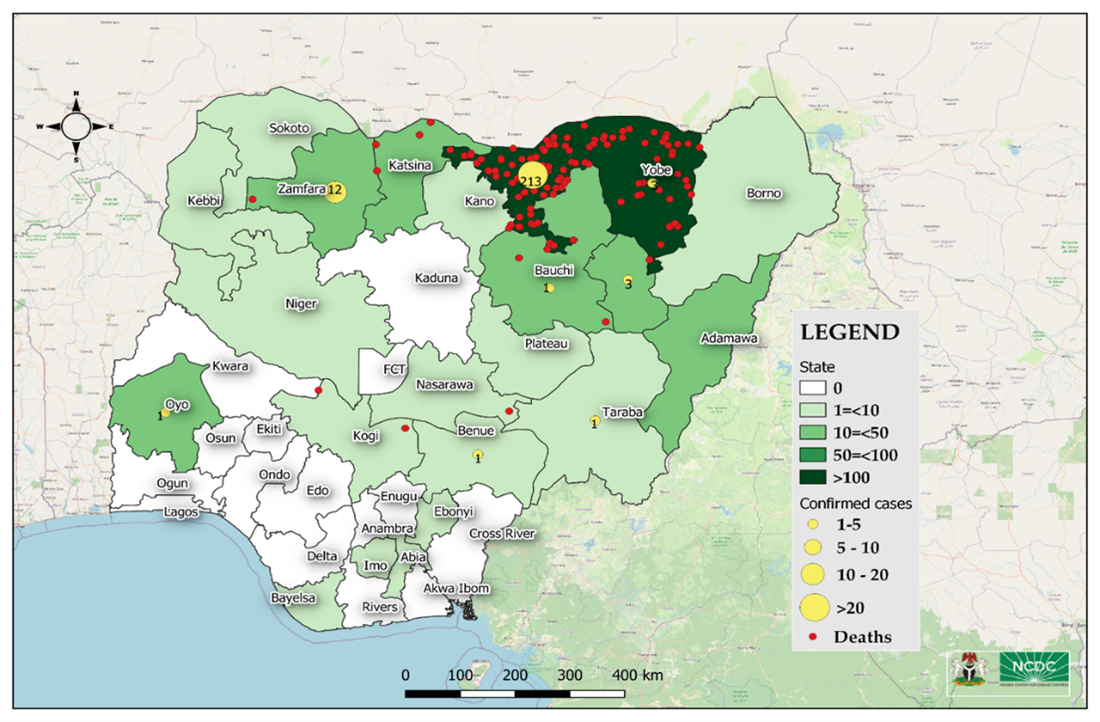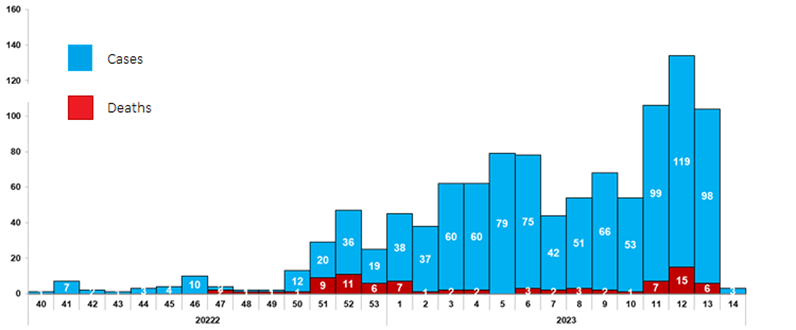Meningitis - Nigeria - World Health Organization
Situation at a glance
Between 1 October 2022 and 16 April 2023, Nigeria reported a total of 1686 suspected cases of meningitis, including 124 deaths, for a case fatality ratio (CFR) of 7%.
Meningitis is a serious infection of the meninges, the membranes covering the brain and spinal cord. It is a devastating disease and a major public health challenge. Neisseria meningitidis (meningococcus), Streptococcus pneumoniae (pneumococcus), Haemophilus influenzae and Streptococcus agalactiae (group B streptococcus) are the main causative agents for meningitis. Vaccines can help prevent meningococcal disease.
Description of the situation
From 1 October 2022 to 16 April 2023, a total of 1686 suspected cases, 532 confirmed cases and 124 deaths (CFR: 7%) have been reported from 81 local government areas (LGAs) in 22 out of 36 administrative states, including the Federal Capital Territory (FCT), in Nigeria.
Males account for 57% (n = 961) of total suspected cases. The highest proportion of reported cases is among children aged 1 to 15 years. Jigawa state accounts for 74% (n = 1252) of all suspected cases, and this state borders the Zinder region in Niger, where a meningitis outbreak has been reported since October 2022.
A total of 481 cerebrospinal fluid samples were collected from patients in 18 states. Out of these samples, 247 tested positive for bacterial infection by PCR test. Among the positive cases, 226 (91%) were caused by Neisseria meningitidis serogroup C (NmC), while 13 cases (5.4%) were caused by Streptococcus pneumoniae, and only one case (0.4%) by Haemophilus influenzae. For 232 samples the result was negative, and for two the result is pending. In the last five weeks alone (epidemiological weeks 11-15), 41 out of 140 samples tested (29%) were positive for NmC. The confirmed cases were reported from eight states including Jigawa (231), Zamfara (six), Yobe (five), Benue (one), Gombe (one), Katsina (one), Oyo (one), and Sokoto (one).
Fig. 1. Map indicating meningitis cases (n = 1686 suspected cases) between 1 October 2022 and 16 April 2023

Source: Nigeria Centre for Disease Control and Prevention (NCDC)
Jigawa state consists of 27 LGAs, of which 25 have reported at least one suspected case. There have been 66 deaths in Jigawa state. During the current outbreak, Maigatari LGA and Sule-tankarkar LGA have both crossed the epidemic threshold of 10 suspected cases per 100 000 population and account for 60% of the total reported cases, with 505 and 247 cases respectively.
The CFR for this outbreak is 7% and 5% at the national and Jigawa state level, respectively.
Fig. 2. Weekly distribution of meningitis cases (n = 1686 suspected cases) between 1 October 2022 and 16 April 2023

Epidemiology of the disease
Meningitis is a serious infection of the meninges, the membranes covering the brain and spinal cord. It is a devastating disease and remains a major public health challenge. The disease can be caused by many different pathogens including bacteria, fungi or viruses, but the highest global burden is seen with bacterial meningitis.
Several different bacteria can cause meningitis. Streptococcus pneumoniae, Haemophilus influenzae, and Neisseria meningitidis are the most frequent ones. N. meningitidis, causing meningococcal meningitis, is the one with the potential to produce large epidemics.
Meningococcal meningitis is transmitted from person to person through droplets of respiratory and throat secretions, usually by asymptomatic carriers. Close, prolonged contact with an infected person, or living with a carrier, facilitates the spread of the disease. The average incubation period is four days but can range between two and 10 days.
The extended meningitis belt of sub-Saharan Africa, stretching from Senegal in the west to Ethiopia in the east (26 countries) and including the northern part of Nigeria, has the highest disease rates. Meningitis in these countries follows a seasonal pattern, being most common during the dry season (December through June) with a peak between March and April, when there is persistent low air humidity and high dust loads that are believed to damage the pharyngeal mucosa and ease the colonization of the nasopharyngeal epithelium by the meningococci. Seasonal epidemics vary in size from year to year.
Response measures implemented during an outbreak, including improved case finding and management as well as mass vaccination campaigns, contribute to outbreak control.
Meningococcal meningitis remains a public health concern, in Nigeria, with outbreaks reported in recent years. With support from WHO, the Nigeria Centre for Disease Control and Prevention (NCDC) is implementing response measures at the national level. These include vaccination, surveillance, active case finding, sample testing, and case management.
Nigeria has implemented interventions to combat meningitis, including introducing the meningococcal A (MenA) conjugate vaccine against NmA from 2011-2022. Through preventive campaigns, Nigeria has vaccinated over 100 million people aged 1 to 29 years, and the vaccine has been included in the country's routine immunization schedule since 2019. Among MenA vaccinated populations in countries of the meningitis belt, the incidence of serogroup A meningitis has declined by more than 99%, and no serogroup A case has been confirmed since 2017. However, there are still annual reports of meningitis cases in the country that are associated mostly with meningococcus serogroup C (NmC).
Insecurity, particularly in Northeast Nigeria, affects vaccination coverage, especially in areas controlled by non-state armed groups. At the national level, immunization coverage remains suboptimal at 50% as of 2021.
Licensed vaccines against meningococcal, pneumococcal and Haemophilus influenzae diseases have been available for many years. These bacteria have several different strains (known as serotypes or serogroups), and vaccines are designed to protect against the most harmful strains. Over time, there have been major improvements in strain coverage and vaccine availability, but no universal vaccine against these infections exists.
Additionally, in November 2022, an outbreak of meningitis was confirmed in the Zinder region of Niger. This region borders Jigawa, which is the worst-affected state in Nigeria. The risk of cross-border transmission is high due to the population movement across the border.
Based on the above information, the overall risk of meningitis in Nigeria is assessed as high at the national level, moderate at the regional level, and low at the global level.
Comments
Post a Comment